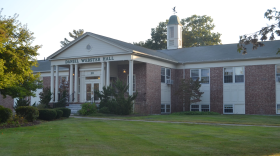Jared Barbosa is an Elementary School guidance counselor who was raised by a professional soccer player. His dad, Manoel “Boom Boom” Barbosa, competed all over the world before settling down in Nashua, N.H.
Jared says professional soccer was his dad’s ticket out of poverty in Brazil. College soccer was his ticket to economic mobility.
He doesn’t think high level sports should exclude low-income kids.
Every Sunday, Babosa plays soccer on the Main Dunstable Soccer Fields in Nashua. He’s on a league of 150 or so mostly Latino guys who have been competing there weekly for years. “There’s kids all over, there’s family, there’s food, there’s music,” he said, “It’s just a good time.”
It was at these Main Dunstable fields on one of these Sundays that Barbosa began to realize something was wrong.
Kids would kick soccer balls on the sidelines. Around town, he’d seen them dribbling in the street and doing tricks on basketball courts. “And seeing the level, the ability,” Barbosa said. “Good players.”
But they weren’t on organized teams.
It didn’t take long for Barbosa and his brother, a college-level soccer coach, to figure it out. The kids’ parents couldn’t afford the city’s soccer club. The cost to play runs from around $700 to $1500 per kid, each year, and doesn’t include uniforms. Some offer financial applications, but the price tag itself was a barrier.
So, they started LHIFA.
Most of the Latin and Hispanic International Futbol Association’s players are men and boys of color. But LHIFA doesn’t turn anyone away. People from all races, ages, genders, skill levels, and payment ability are welcome.

Most families pay $100 a year, per kid. Siblings are half-off, uniforms are included.
Last year, two of the club’s five youth teams won the state championships.
This club is demanding. You can see it in the footwork: nine year olds are fake each other out, and pass to open players across the field.
Nelly Ciraso’s kids are serious about soccer, but her family couldn’t afford the local club team. “It’s too expensive,” she said. Now, her kids play on the Barbosas’ team.
“I love the coach because he’s strict,” said Nelly Ciraso said from the sidelines, as her sons scrimmaged. “He’s nice, but he’s firm with the kids and I think they need that.” The Cirasos are one of many families who said they were priced out by the local club team's fees.
Geovanny Quintana plays on the under twelve team. Surrounded by teammates on the field after practice, he said “they coach us hard, they don’t want us to give up. They want us to be professional soccer players who can get into the professional leagues like Barcelona and all of them. So that’s why we train hard every single day.”

One reason soccer clubs are so expensive is they pay professional coaches. Jared and Hayden Barbosa coach at a professional level. For this club, they do it for free.
To pay for tournaments and field time, the brothers put on fundraising events and appeal to local sponsors.
On the one hand, it really is about the game. It’s also about something else.
“Those who participate in extracurricular activities year round are 400 percent more likely to go to college than kids who don’t at all,” Jared said, repeating himself, “400 percent! I’m going to take that stat and run with it.”
Barbosa doesn’t stop with soccer, either. He gets to know players’ school teachers and parents. “I’m so invested, I can’t even--” he broke off, “sometimes I’m driving home from practice and I can’t even think. Like, I love these kids so much.”
This report comes from the New England News Collaborative. Eight public media companies coming together to tell the story of a changing region, with support from the Corporation for Public Broadcasting.








